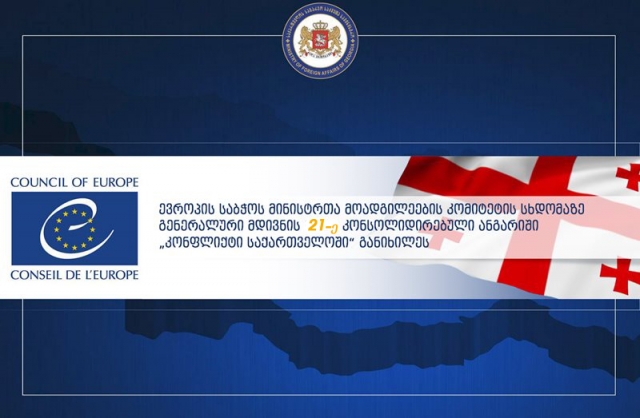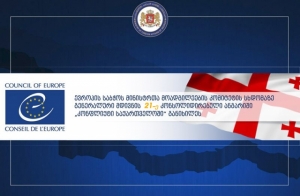Council of Europe Releases Annual Consolidated Report on Conflict in Georgia
The 21st Consolidated Report on the conflict in Georgia traditionally presented by the Secretary General of Council of Europe was discussed at the meeting of the Committee of Ministers of the Council of Europe held on April 22 via video conference.
The Secretary-General's report covers the period from October 2019 to March 2020 and describes the difficult security, human rights and humanitarian situation in Georgia’s occupied territories and along the occupation line during the reporting period, leading to illegal actions in the occupied regions.
According to the MFA of Georgia, the report emphasizes that the situation in the occupied territories "is extremely tense.” The security situation on the ground has been assessed by various interlocutors as deteriorating, in particular in reference to the serious security challenges in the Chorchana-Tsnelisi area since August 2019. "The human rights and humanitarian situation of the conflict-affected communities has remained under strain, notably due to persisting and/or newly imposed restrictions on freedom of movement, documentation issues and obstacles on access to basic services.”
It is also noted that this situation affects vilnerable groups' access to humanitarian aid and medical services, especially for Georgians living in Akhalgori and Gali. Further, the so-called checkpoints were completely closed by the occupation forces due to the COVID-19 pandemic.
The document also mentions the illegal detention of Dr. Vazha Gaprindashvili, which "caused concern at the national and international levels," leading to the release of Vazha Gaprindashvili after two months of arbitrary detention.
Along with important topics, the organization welcomes the activities of “Peace Fund for a Better Future” in the framework of Peace Initiative “Step to a Better Future”. It is noted that the initiative to create opportunities for education, trade and relocation will help to start a dialogue and reconciliation process.
The statement again indicates Russia's non-compliance with international obligations and that country continues factual annexation process.
The severe human rights and humanitarian conditions are also highlighted.” The human rights and humanitarian situation of the conflict-affected communities remained under strain, notably due to persisting and/or newly imposed restrictions on freedom of movement, documentation issues and obstacles on access to basic services.”
At the Committee of Ministers the Georgian side emphasizes that the situation on the ground is deteriorating due to the illegal process of erecting artificial barriers, which destabilizes the situation and forces the population to leave their homes. The situation is even more alarming when the whole world is involved in the fight against the pandemic of Covid-19 and Russia continues the illegal process of raising banners marking the so-called "border" near the village of Takhtisdziri, Kareli Municipality, on the occupation line of the Tskhinvali region.
According to the Georgian side, Georgia's peace initiative and concrete steps in this direction are a clear example of the policy of involvement in the occupied regions, which aims to improve the social and economic conditions of the conflict-affected population. Given the difficult conditions of the spread of COVID-19, the Georgian government is ready to provide full assistance to people living on both sides of the occupation line.
The MFA also stressed the importance of supporting the international community and the need for the international community to be firm, united and to send a clear message that Russia's violation of international norms is unacceptable and Moscow must change its aggressive policy.
The Consolidated Report of Georgia can be read in entirety here.
Source: Ministry of Foreign Affairs of Georgia
By Mariam Merabishvili












